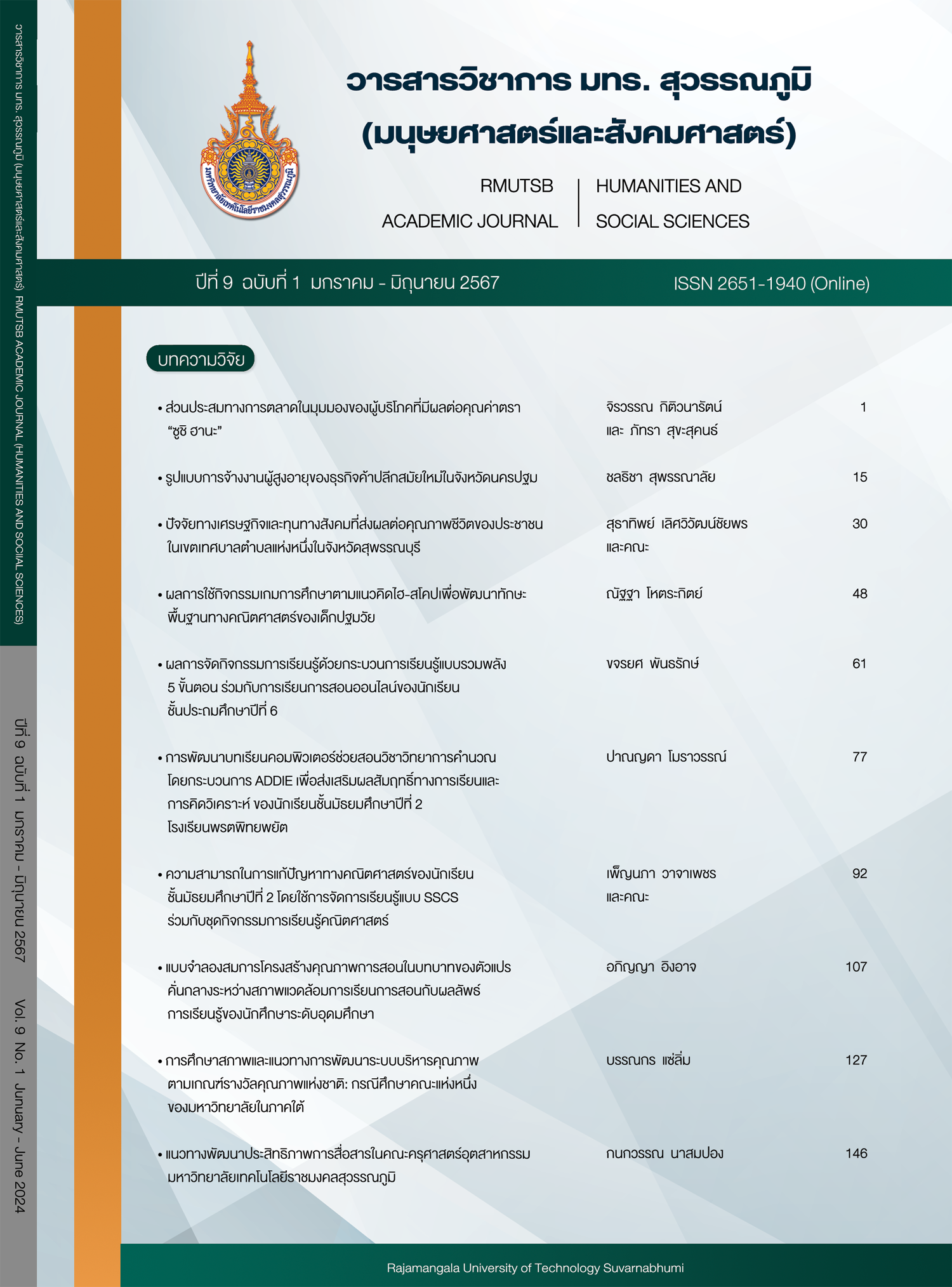The ability to solve mathematical problems of eighth-grade students by SSCS learning management combined with mathematics learning activity packages
Main Article Content
Abstract
The purpose of this research was to study the mathematical problem-solving ability of eighth-grade students after learning by using the SSCS learning management combined with the mathematics learning activity package. The sample group in this research was 15 students selected from a class of eighth-grade students from Wat Pho Sadet School, studied in semester 2 of the academic year 2021, using a group random sampling, in which the classroom was a randomization unit. Research tools used composed of 1) SSCS learning management plan combined with a mathematics learning activity package on prism and cylinder for eighth-grade, and 2) a mathematical problem-solving ability test and problem-solving ability scoring. Statistics used in data analysis were mean, percentage, and Wilcoxon signed rank test statistics.
The results showed that the mathematics problem-solving ability of eighth-grade students after learning by using SSCS learning management combined with the mathematics learning activity package about prisms and cylinders for eighth-grade was at a good level. When considering each step, the results were as follows: 1) Problem understanding step, the students received a score of 89.44 percent; their abilities were at an excellent level, 2) Problem solving planning, the students received a score of 60.00 percent; their abilities were at a fair level, 3) Problem solving step, the students received a score of 83.33 percent; their abilities were at an excellent level, and 4) Checking results step, the students received a score of 78.33 percent; their abilities were at a good level.
Article Details

This work is licensed under a Creative Commons Attribution-NonCommercial-NoDerivatives 4.0 International License.
References
Chin, C. (1997). Promoting higher cognitive learning in science through a problem-solving approach. React, 1997(1), 7-17.
Kesi, J. (2017). The results of SSCS learning activities to promote mathematical problem solving ability and mathematics learning achievement of Grade 3 students (Master’s thesis). Mahasarakham University, Mahasarakham. (in Thai)
Khamkoon, P. (2013). Development of science activity packages, subject group learning science about the life of plants to develop thinking skills by using the knowledge-seeking cycle teaching model (Master’s thesis). Rajabhat Rajanagarindra University, Chachoengsao. (in Thai)
Laoreendee, W., Kitrungruang, P., & Sirisamphan, O. (2017). Proactive learning management strategies to develop thinking and raise the quality of education for the 21st century. Nakhon Pathom: Petchkasem Printing Group. (in Thai)
Makanong, A. (2010). Mathematics: Teaching and learning. Bangkok: Center for Academic Textbooks and Documents, Faculty of Education, Chulalongkorn University. (in Thai)
Makanong, A. (2016). Mathematical skills and processes: Development for development. Bangkok: Center for Textbooks and Academic Documents, Faculty of Education, Chulalongkorn University. (in Thai)
Mala, T. (2018). The calculation and reasoning skills in mathematics learning area diagnostic test development for Prathom Suksa lll students in Lampang primary education service area 2. RMUTSB Academic Journal (Humanities and Social Sciences), 3(1), 1-13. (in Thai)
Noisri, W. (2020). The development of SSCS learning activities to enhance mathematical problem solving ability conic section for high school students 4. Journal of Santaphon College, 6(1), 30-38. (in Thai)
Pizzini, L., Shepardson, P., & Aball, K. (1989). A rationale for and the development of a problem solving model of instruction in science education. Science Education, 73(5), 523-534.
Samranwong, N. (2017). SSCS-based learning management for developing mathematical problem-solving abilities and mathematics learning achievement. applied story for students in Grade 5 (Master’s thesis). Burapha University, Chonburi. (in Thai)
Tanyarattanasrisakul, M. (2021). Development of logical thinking ability, mathematical learning habits of mind, and work commitment application on " Analysis of quantitative data and Its presentation" of Matthayomsuksa 6 Student using the Buddhist method focused on active learn. RMUTSB Academic Journal (Humanities and Social Sciences), 6(1), 92-108. (in Thai)
Thamrongsothisakul, W. (2017). Reflections on the concept of teaching packages. set of learning activities and learning series. Journal of Education Naresuan University, 19(3), 356-369. (in Thai)
Thipkong, S. (2002). Curriculum and teaching of mathematics. Bangkok: Develop Academic Quality. (in Thai)
Tornong, R. (2018). The effect of SSCS learning management combined with Polya's problem-solving process. Effects on problem solving ability of Prathom Suksa 6 Students. Walaya Alongkorn Review Journal (Humanities and Social Sciences), 8(3), 13-25. (in Thai)
Wibawati, F. (2009). Penerapan Pem belajaran Kooperatif SSCS (search solve create and share) Terhadap Hasil Biologi Siswa Pokok Bahasan Ekosistem Di Kelas Vii E Semester. Retrieved November 26, 2022 , from : http://eprints.ums.ac.id/4326/1/A420050100.pdf
Yasin, M. (2020). The effect of SSCS learning model on reflective thinking skills and problem solving ability. European Journal of Educational Research, 9(2), 743-752.


